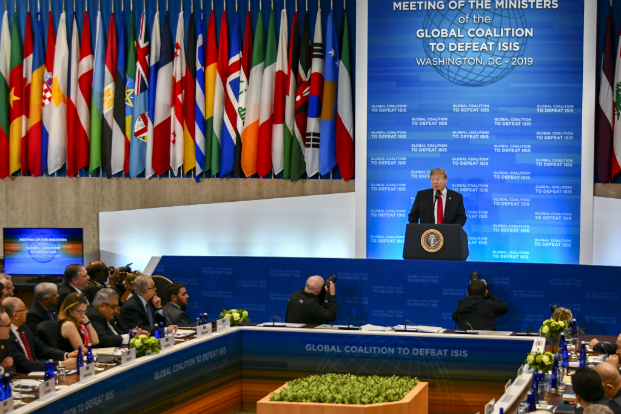
President Donald Trump delivers remarks at the Meeting of the Ministers of the Global Coalition to Defeat ISIS at the Department of State in Washington, D.C., on February 6, 2019. State Department photo by Ron Przysucha.
Representatives from the 79 countries that make up the Global Coalition to Defeat ISIS met at the State Department in Washington, D.C., on Wednesday to plan a “new stage in an old fight,” as the US conducts its “well-coordinated” drawdown in Syria, Secretary of State Mike Pompeo said.
Though he announced ISIS’ defeat via Twitter in December, Trump said Wednesday the “formal” announcement of the complete removal of ISIS would come in the near future, but “I don’t want to say it too early.”
A senior administration official, speaking with reporters in advance of the meeting, said the US is considering redeploying some forces from Syria to Iraq to continue to fight the “potential resurgence of ISIS.” This includes a possible further build up at Al Asad AB, Iraq, which is “extremely valuable” to “keep a very close eye on ISIS.” Inside Syria, the strategic operating location at Al-Tanf “would be the last place that we would withdraw from.” The schedule for US forces leaving that base has not been set, and “it would be conditions-based,” the administration official said.
“This afternoon, I want to applaud the outstanding men and women of the United States military, incredible people, for their remarkable skill and precision throughout this entire campaign,” Trump said.
US Central Command boss Army Gen. Joseph Votel told members of the Senate Armed Services Committee on Tuesday that 1,000 to 1,500 ISIS fighters now operate across less than 20 square miles of territory, compared to the 34,000 square miles once controlled by ISIS in Iraq and Syria. Trump said he expects 100 percent of the land ISIS once held to be freed from the group, though small cells still remain. “Their land is gone, it’s a big factor—their land is gone,” Trump said.
However, Pompeo emphasized that ISIS is still a “menace,” and it is “our generation’s responsibility to stop [it].” The coalition must continue to attack its “residual networks and operations,” he added.
Also on Wednesday, Owen West, assistant secretary of defense for special operations and low-intensity conflict, told the House Armed Services Committee the United States should not withdraw troops from Syria.
“Your former boss, [then-Defense] Secretary [Jim] Mattis, disagreed with the President’s plan to withdraw from Syria. Do you think he was wrong?” Rep. Seth Moulton (D-Mass.) asked West. “No, sir,” West responded.
The top special operations civilian official said the campaign to keep ISIS from regrouping will be less effective without having American troops there. That echoes concerns voiced during a SASC hearing the day before when Votel, Ranking Member Jack Reed (D-R.I.), and Sen. Roger Wicker (R-Miss.) agreed that removing US forces from the Middle East will make it harder to oversee how taxpayer dollars are being used by local militaries.
“The nature of the fight is changing,” Pompeo said. “We all need to bolster our ability to share intelligence and information with each other.”